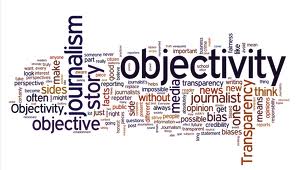 Journalists often claim that their own biases and the pressures from advertisers and media owners do not affect their work because of their professional norm of ‘objectivity’.
Journalists often claim that their own biases and the pressures from advertisers and media owners do not affect their work because of their professional norm of ‘objectivity’.
However Jonathan Cook argues that the professionalisation of journalism was a deliberate strategy to overcome the public perception that newspapers served their owners interests. "The campaign of 'professionalising' the media was so successful that, after their training, even the journalists believed they were disinterested parties in reporting the news."
Journalistic objectivity has two components. The first is ‘depersonalisation’ which means that journalists should not overtly express their own views, evaluations, or beliefs. The second is ‘balance’ which involves presenting the views of representatives of both sides of a controversy without favouring one side. Associated conventions include:
authoritative sources, such as politicians must be quoted (in this way the journalist is seen to distance him- or herself from the views reported, by establishing that they are someone else’s opinions); ‘fact’ must be separated from ‘opinion’, and ‘hard news’ from ‘editorial comment’; and the presentation of information must be structured pyramidically, with the most important bits coming first, at the ‘top’ of the story.
Any journalistic comment comes from ‘specialist’ correspondents who are quoted as experts by the reporter in the same way that a scientist might be. The news reporter refrains from such comment. These conventions perpetuate the impression that reporters are simply conveying the ‘facts’ and not trying to influence how people interpret them. The ideal of objectivity gives journalists legitimacy as independent and credible sources of information.
The rhetoric of journalistic objectivity supplies a mask for the inevitable subjectivity that is involved in news reporting and reassures audiences who might otherwise be wary of the power of the media. It also ensures a certain degree of autonomy to journalists and freedom from regulation to media corporations. However, news reporting involves judgements about what is a good story, who will be interviewed for it, what questions will be asked, which parts of those interviews will be printed or broadcast, what facts are relevant and how the story is written.
value judgements infuse everything in the news media... Which of the infinite observations confronting the reporter will be ignored? Which of the facts noted will be included in the story? Which of the reported events will become the first paragraph? Which story will be prominently displayed on page 1 and which buried inside or discarded? ...Mass media not only report the news—they also literally make the news.
Objectivity in journalism has nothing to do with seeking out the truth, except in so much as truth is a matter of accurately reporting what others have said. This contrasts with the concept of scientific objectivity where views are supposed to be verified with empirical evidence in a search for the truth.
Ironically, journalistic objectivity discourages a search for evidence; the balancing of opinions often replaces journalistic investigation altogether. FAIR’s survey of environmental reporting found that it tended to be “limited to discussion of clashing opinions, rather than facts gathered by the reporters themselves.”